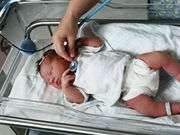Preliminary study of new drug for RSV yields promising results, experts say.
(HealthDay)—An experimental drug shows promise as a treatment for a common and potentially serious illness known as respiratory syncytial virus (RSV).
Currently, there is no treatment or vaccine for RSV, which can be deadly for infants and the elderly. Kids are nine times more likely to die from this virus than from flu, the investigative team pointed out.
The drug, dubbed ALS-008176 for now, was tested in a group of adults infected with RSV. It reduced the amount of virus and improved their symptoms, the researchers said.
"These results highlight the drug's potential as a safe and effective therapy for managing clinical disease," said Dr. Matthew McClure, of San Francisco-based Alios BioPharma, Inc., the drug's maker.
Whether it will have the same effect in vulnerable children or seniors remains to be seen, however.
RSV causes wintertime epidemics of respiratory illness in U.S. children. It's the most common cause of bronchiolitis and pneumonia in children under 1 year of age in the United States and a major cause of hospitalization, McClure said.
Approximately 20 percent of infants will have had RSV by age 1, and nearly all will have had the virus by their second year, he said.
The new drug still needs more testing and couldn't be available for several years, the researchers said. It's currently being evaluated in RSV-infected infants, McClure added.
The results of the trial were published Nov. 19 in the New England Journal of Medicine. The research was funded by Alios BioPharma.
For the study—the second of three phases of research needed before medications can be approved in the United States— 62 volunteers were deliberately infected with RSV. The participants randomly received one of three doses of ALS-008176 or an inactive placebo drug. Treatment was given every 12 hours for five days.
Among those who received the highest doses, the amount of the virus was reduced 85 to 88 percent, compared with those who received the placebo, the researchers found.
Moreover, the virus did not return after treatment, no serious side effects occurred and no one discontinued treatment, the study authors said.
But Dr. Antonio Rodriguez, a pediatric pulmonologist at Nicklaus Children's Hospital in Miami, pointed out that RSV is more serious in children than in adults.
"The question is if reducing the amount of the virus in children is going to be significant enough to make a difference in the disease severity," he said.
If the drug reduces the coughing, wheezing and breathing difficulty that kids with RSV suffer, then it would be a significant step forward, Rodriguez added.
Dr. Bruce Hirsch, an infectious diseases specialist at North Shore University Hospital in Manhasset, N.Y., called the study a "good first step." Because the drug wasn't tested on children and the elderly who have other medical conditions, the jury is still out on its effectiveness, he said.
"RSV is not a health issue in healthy young adults. It can be a significant problem in elderly patients and in infants," he explained.
"This is just a preliminary study, but it's quite promising," Hirsch added.
Researchers are also trying to develop a vaccine against RSV. In a study published earlier this month in the journal Science Translational Medicine, scientists tested an experimental nose-drop vaccine in 15 adults, 15 children infected with a mild form of RSV, and 30 infants and children who had not been infected.
The findings showed a strong immune response after a single dose of vaccine, said study author Dr. Ruth Karron, director of the Center for Immunization Research at Johns Hopkins University Bloomberg School of Public Health, in Baltimore.
Scientists think a proven vaccine could still be years away. But those results add to a list of advances toward routine immunizations against the disease.
More information: For more about RSV, visit the U.S. Centers for Disease Control and Prevention.
Journal information: New England Journal of Medicine , Science Translational Medicine
Copyright © 2015 HealthDay. All rights reserved.






















